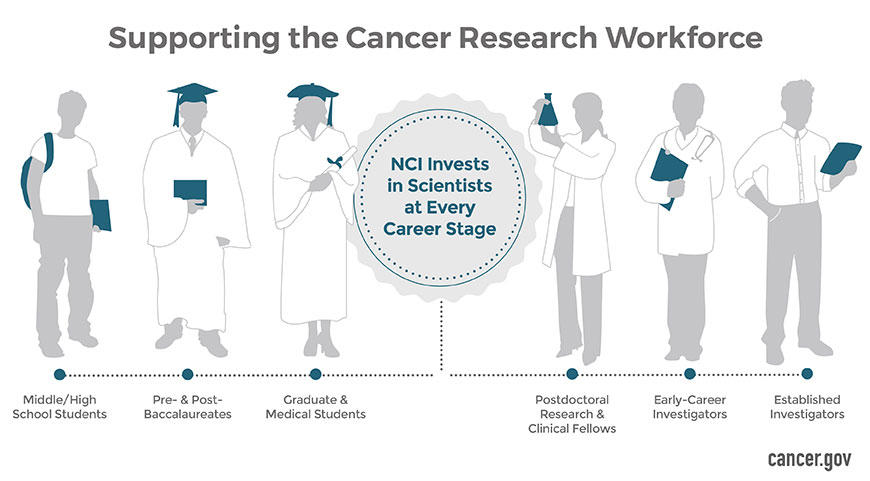NCI develops and supports a cadre of exceptional scientists from a variety of disciplines across the career continuum, from high school students just starting to explore a career path to well-established cancer investigators. Having a community of researchers from diverse backgrounds and at all levels of expertise strengthens cancer research and its translation to patient care.
NCI offers a number of training opportunities at NCI offices and laboratories in Maryland (intramural) and funding mechanisms to support individuals and research teams (extramural) as they pursue new discoveries and technologies to overcome cancer. Scientists can apply for training, career development, and mentored research awards.
Training the Next Generation of Cancer Researchers
NCI supports the training of students and early-career scientists, ranging from the high school level through the postdoctoral years and beyond. NCI fellowships are available in fields as diverse as cancer prevention, behavioral sciences, epidemiology, genetics, immunotherapy, and technology transfer.
Increasing Investment in Early-Stage Investigators
Scientists embarking on independent careers can face challenges that impede their success and make it difficult to remain in research. To ensure a robust pipeline of future cancer research leaders, NCI supports early-stage investigators (ESIs) in many ways. Here are just a few of the opportunities available to ESIs:
- The Method to Extend Research in Time (MERIT) Award provides up to 7 years of support to certain investigators who have their first R01 grant compared with 5 years of support for the traditional R01 grant. The award offers investigators more stability to launch their careers, enables creativity and innovation, and provides a longer amount of time during which they can apply to renew their current grant and/or apply for new grants.
Supporting Established Investigators
NCI supports scientists who have an established record of productivity through a variety of funding mechanisms.
A large portion of NCI’s budget funds investigator-initiated research proposals that have undergone a rigorous peer-review process. This funding, through the R01 and similar mechanisms (including the R23, R29, R35, DP2, and RF1), provides support to highly skilled scientists, working in their areas of expertise, who have submitted encouraging preliminary data. Much of the progress we have made against cancer to date had its origins in investigator-initiated research.
The institute also provides support through collaborative funding mechanisms, such as the program project grant (P01) for a group of interrelated research projects and the Translational Research Program’s Specialized Programs of Research Excellence (SPORE) grants.

